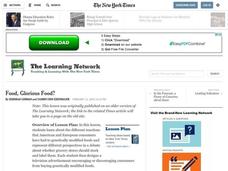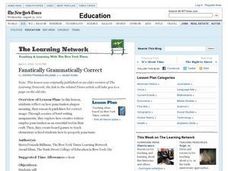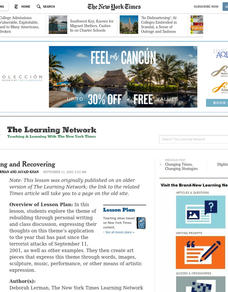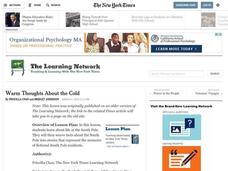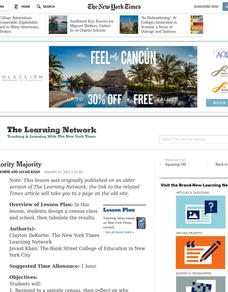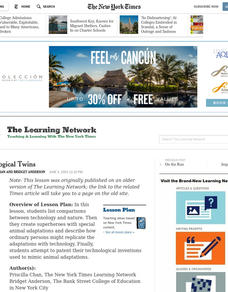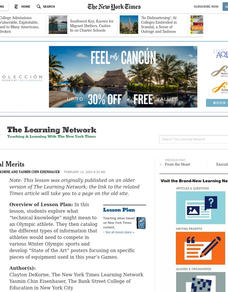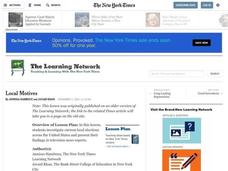Curated OER
Credible Sources on the Internet: What to Trust, What to Dismiss and When to Cite a Source
Wait, you mean researchers don't all use Wikipedia? Teach your class about intelligent research with a lesson about evaluating digital sources. The lesson starts with a quickwrite and includes vocabulary exercises and several...
Curated OER
Food, Glorious Food?
How are the reactions between American and European consumers different when it comes to genetically modified foods? Use the New York Times article "Consumers in Europe Resist Gene-Altered Foods" to inform your middle schoolers about the...
Curated OER
Fanatically Grammatically Correct
Research guidelines for correct usage, then explore how creative writers employ punctuation as an essential tool in their craft. Secondary classes create board games to teach elementary school students how to properly punctuate. From the...
Curated OER
Don't Bet The House On It!
Great real-world math application! Have the class compare and contrast their estimated home price and income data with actual data. In groups, they participate in simulations to discover how the housing market and mortgages operate....
Curated OER
The End?
This instructional activity asks young readers to predict what will happen to Harry Potter. While the question has been answered by the last book and film in the series, the concept and links provided by The New York Times’ Learning...
Curated OER
Money Management Part III: Savings Accounts and Cash vs. Credit
Help your class understand the importance of saving and managing their money. Here is part three to a unit on credit, cash, and savings. Learners discuss savings accounts and the idea that a budget plan can help them avoid costly credit...
Curated OER
Rebuilding and Recovering
What does it mean to rebuild and recover after a major event? Your class will explore this theme while they discuss and discover the events surrounding September 11. They will also look at other examples and then create art pieces that...
Curated OER
Warm Thoughts About the Cold
“What do you think life is like at the South Pole?” After responding to this journal prompt, class members read and discuss the New York Times article, “At South Pole, New Home for a New Era.” Using resources available from the Times’...
Curated OER
Screen Play
High schoolers examine the New York Times review of the film adaptations of J.R.R. Tolkien's The Lord of the Rings and explore the elements of scriptwriting. They read the article about the film adaptation screenplay and examine a sample...
Curated OER
The Minority Majority
Students design a census class and school, then tabulate the results. They respond to a sample census, then reflect on why questions of race and national origin are different.
Curated OER
Fit to Be Tied (In)
How do the films we watch affect our purchasing behavior? Considering the profiles of given consumer demographics, the class analyzes real advertisements and the effectiveness of their power on consumerism. THey create posters that...
Curated OER
Technological Twins
Students list comparisons between technology and nature. Then they create superheroes with special animal characteristics and describe how ordinary persons might replicate the changes with technology.
Curated OER
Technical Merits
What is technical knowledge? The class explores what technical knowledge might mean to an Olympic athlete. They catalog the different types of information that athletes would need to compete in various Winter Olympic sports and develop...
Curated OER
That's Moor Like It!
How do modern adaptations of Shakespearean plays relate to their original source material? Middle and high schoolers focus on Shakespeare's play Othello and its screen adaptation "O" to explore how modern film adaptations of Shakespeare...
Curated OER
Direct Effect
Discover the damage that was caused by the terrorist attacks on September 11th with your class. They will learn about the events of that day and the litigation process for damages incurred that day. Their research will cover the various...
Curated OER
Local Motives
Investigate current local elections across the United States with this New York Times reading lesson. Using informational text, middle and high schoolers research local elections and create their own news reports about what they...
Curated OER
A Way with Words
How do facts and opinions impact the news? After reading "How to Cover a War" from the New York Times, middle schoolers evaluate the claims in the article. They also consider the media's responsibilities in reporting during wartime....
Curated OER
Not Just the Facts
Encourage your learners to explore the differences between hard news and news analysis. They outline a complex news analysis about the upcoming presidential election, then endeavor to write an analysis of the same topic, using local...
Curated OER
Strong Convictions
How can the rhetorical structure of an editorial help to develop its argument? Use this New York Times editorial to emphasize the importance of structure in a piece of informational text. Adolescent writers then use the editorial as a...
Curated OER
Asking the Questions and Questioning the Answers
What would you ask a presidential candidate if you had the chance? Bring politics to your language arts classroom with this lesson, in which young readers brainstorm questions they would have liked the presidential candidates to answer....
Curated OER
Draft Dilemmas
Consider the possibility of a new U.S. draft with this lesson, which encourages class debate and persuasive arguments. Middle and high schoolers discuss how such a draft might be enacted and how they would feel about it. They write...
Curated OER
Proving (a Theorem) and Disproving (a Theory)
As a cross-curricular lesson, your class examines the issues of gender discrimination, careers, and gender roles. They read and discuss an article, prepare a proof of the Pythagorean theorem as a class, and develop a creative...
Curated OER
Stop the Fighting and Start Uniting
Research current and proposed peace talks around the world with this New York Times lesson, Using the Darfur peace talks in Abuja, Nigeria as a starting point, middle schoolers create a news program on the subject. They propose a future...
Curated OER
Science in the Court Room
Share their opinions on the use of DNA databases in criminal investigations. After reading an article, they evaluate the pros and cons of the databases and work in groups to answer discussion questions. They write a letter to a state...



